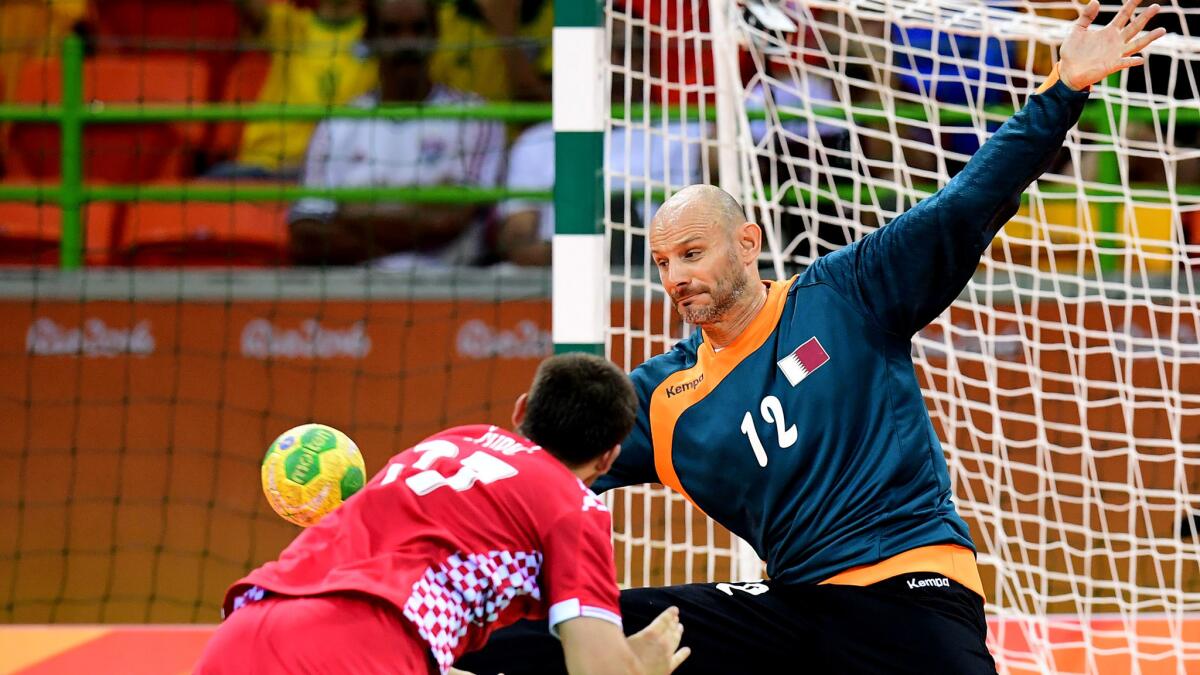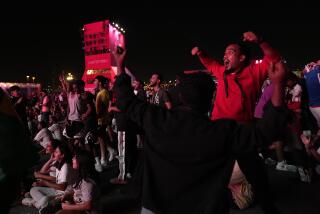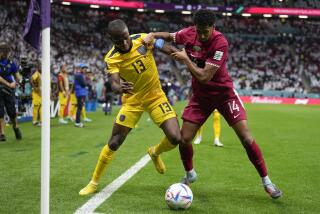Qatar’s handball team is a United Nations of countries

- Share via
Reporting from Rio de Janeiro — It was time for the national anthems at Future Arena in Rio’s Olympic Park, and the 14 members of the Qatar men’s handball team stood at attention, left arm over a teammate’s shoulder, right hand over their heart, as the first bars of “as-Salam al-Amiri” (Peace to the Prince) echoed through the venue.
“Qatar will always be free,” they sang in Arabic, “by the spirit of the loyal.”
Belted it out, every one of them. The goalkeeper from Montenegro, the right back from Croatia, the left back from France, the center back from Cuba, the right wing from Bosnia, the left wing from Syria, the pivot from Spain.
“Travel the high road, travel by the guiding light of the Prophets.”
And travel they have, from all corners of the globe to represent the Persian Gulf nation that is smaller than Connecticut with a population of 2.2 million, nearly 2 million of which are foreign workers. Its contingent of Olympic athletes in Rio has a similar composition: a miler from Morocco, a half-miler from Sudan, a sprinter from Nigeria, a hammer thrower from Egypt, a boxer from Germany, a men’s beach volleyball team from Brazil and Senegal.

But none is quite as striking, or controversial, as its entry in men’s team handball that plays Germany in the quarterfinals Wednesday for a spot in the medal round. Fourteen players, 11 foreigners, nine countries, four continents.
“For me, it’s good,” said Danijel Saric, a 39-year-old goalkeeper born in Doboj, Bosnia. “If you can bring these players, why not?”
And that’s the rub. Qatar can bring these players. International Handball Federation rules allow players to freely change flags after a three-year waiting period, a loophole that has been closed in other sports that lock you into a country once you play an official game for its senior national team.
But Qatar? Team handball?
It is game dominated by Europeans and almost nonexistent in the Americas, Africa and Asia. Only once in Olympic history has a non-European men’s team won a medal, a silver by host South Korea in 1988.
The last time a non-European nation finished on the podium at a world championships was last year, by a Persian Gulf speck with the world’s third largest natural gas and oil reserves.
“Some people say that if Qatar wants this player, they just go get them and give them citizenship,” said Hamad al-Obaidy, the team’s press officer. “But our government doesn’t naturalize people just for sport. They must meet all the conditions and rules, like anyone else. We have other players in Qatar but they have not met the rules.”
Statistics compiled by the IAAF, track and field’s international governing body, found that 45 athletes changed national allegiances to compete for Bahrain between 2012 and 2016. Second on the list? The United States, with 39. Qatar was sixth with 13.
But those are individual athletes competing in individual events. An entire team, or nearly an entire team, is next-level stuff. The opening game of the 12-nation handball competition in Rio, two Sundays ago at 9:30 a.m., was between Croatia and Qatar. It was time for the anthems, and Croatian-born right back Marko Bagaric stood at attention. And privately winced.
Bagaric plays for Qatar now.
MORE OLYMPICS NEWS
IOC executive Patrick Hickey targeted in police probe into ticket scalping
Injuries will keep runner Abbey D’Agostino out of 5,000-meter final
Column: American women are dominating the Games, and it didn’t happen by accident
More to Read
Go beyond the scoreboard
Get the latest on L.A.'s teams in the daily Sports Report newsletter.
You may occasionally receive promotional content from the Los Angeles Times.






